Types of Lenses & Coatings
Quick Links
 |
Types Of Lenses & Coatings |  |
Anti-Reflective Coatings |  |
Blue Light Lenses |
 |
Progressive Lenses |  |
Transition Lenses | ||
 |
Polarised Lenses |  |
How to Clean Your Glasses |
Types of Lenses & Coatings
At Focal Point we use and recommend only world leading brands in lens optical performance and technology. Although they may look the same as generic lenses to the naked eye, they are certainly not. The technology and precision manufacturing processes that go into producing the lenses is incomparable. For example you wouldn't expect sharp crisp images from a non premium brand of digital camera. The same principal applies to to your glasses lenses.
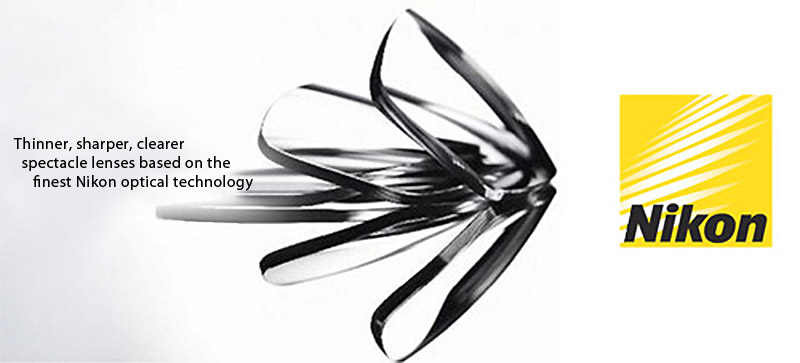
Choosing the correct type of lenses will depend on your lifestyle and your prescription. To name just a few options; there are high index materials which will reduce the thickness of lenses, various anti reflective and photochromatic coatings which can be applied, as well as tints. Our optometrist can discuss all the options with you
Glass Lenses
Glass lenses are more scratch resistant than plastic but more vulnerable to breaking if dropped. Glass lenses can be chemically harden to make them shock resistant. They are also slightly heavier than plastic lenses.
Plastic Lenses
Plastic lenses are lighter and more impact resistant than glass and are ideal if you work in a rough environment. They are more suited for the sporty and physical type person. Although they scratch more easily, hard coatings can be applied.
High Index Lenses
Chemists have created a variety of new plastic materials that bend light more than the conventional plastic lenses meaning less lens material is required to correct your vision. High index lenses are thinner and lighter than standard regular lenses. This makes your spectacles more comfortable to wear. They are also great if you have a high prescription or have selected a frame where the sides of the lenses are visible.

Technology is improving all the time with photochromatic lenses. They allow your spectacles to change from light to dark in the presence of ultraviolet light blocking 100% of harmful UVA and UVB rays. They are great for people who frequently spend time outdoors. Click here to find out more
TYPES OF COATINGSAnti-scratch Coatings
A varnish is applied to both sides of all our lenses to protect them for rigorous day to day use.
Anti-reflective CoatingsWe recommend this coating to all our customers. Although there is an additional expense, the coating reduces glare and reflections off your lenses. This increases the amount of light that reaches your eyes and provides brighter, crisper and clearer vision. Click here to find out more...
UV Coatings
When this is applied, the lenses give 100% protection from harmful UV rays.
 |
Back to top |
Progressive Lenses
Around the age of 40-50, most people start to have difficulty focusing at close range. The first indication that something is changing is that your single vision lenses can no longer be satisfactorily used for focusing on small print or near objects. For example, you may find yourself having to strain to read a menu. So you compensate by holding printed materials further and further away to bring them into focus. This is a sign of a natural eye condition that everyone faces sooner or later. The condition is called presbyopia. Presbyopia is a natural universal condition, diminishing the eyes ability over time to focus on near objects. Our close-up sight is what's affected at first. And within a few years, our mid-distance vision from 2-10 feet is also affected.Presbyopia can be corrected with proper diagnosis and corrective lenses. And while many types of lenses can help with some of the symptoms of presbyopia, only progressive lenses allow you to see near, far and everything in between with one pair of lenses. Multi-focal progressive lenses are a better solution in many instances because they offer the crispest, smoothest, most comfortable vision at all distances.
Choosing the right frames.Multi-focals (or graduated or progressive lenses) are a form of spectacle lens. They contain three powers- the top portion of the lens for distance vision, the central portion for intermediate vision (such as for computer use), and the lower portion for reading. The powers gradually change down the lens, so that there are no visible markings on the progressive lens.
Because of the multi-vision zones you need a frame with greater depth to accommodate the different zones. Our optometrist will evaluate the which frames are suitable for you and progressive lenses. Selected frames need about 16-18mm below the centre of the eye when looking straight ahead. This allows for an adequate zone for reading.
Adapting to progressive lenses
Normally a quick adaptation period anywhere from minutes to a few days is required when you get your first pair of prescription eye glasses that are fitted with progressive lenses. Some people with strong prescriptions do take a bit longer to adapt to the progressive lenses.
Manufacturers are aware of the fact that not everyone will be comfortable wearing progressives, so most offer a trial period of a few weeks during which you can exchange the progressives for lined bifocal lenses or single vision reading glasses if you are not able to wear the progressives successfully.
 |
Back to top |
Polarised Lenses
Polarised lenses eliminate glare from all around you. There are different types of glare affecting your vision, these include the following:
Distraction glare - caused by reflections from your lens surface resulting in eye fatigue.
Discomforting Glare - caused by everyday bright light and can occur during cloudy days. This condition causes you squint, leading to eye fatigue
Disabling Glare - caused by excessive intense light and actually blocks your vision, making situations dangerous
Blinding Glare - caused by reflected light off smooth, shiny surfaces which can also block your vision.
If you do a lot of driving or require your vision to be unaffected by glare then you need polarised lenses. Polarised lenses are perfect for activities where glare is an issue such as fishing, boating and skiing.
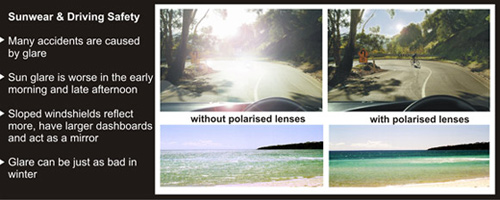
 |
Back to top |
Anti-reflective Coatings
Anti-reflective coatings on your spectacle lenses is a must if you want the best performance from your vision. The benefits of anti-reflective coatings far out way the cost. The innovative coating improves your vision by removing glare and reflections giving you, sharper vision which is ideal for driving at night or working in front of a computer.
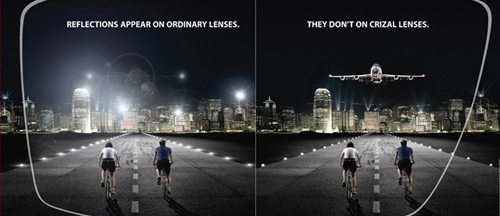
The anit-reflective coating eliminates reflections, making your spectacle lenses look nearly invisible so people can see your eyes and facial expressions more clearly. Anti-reflective glasses are also more attractive, so you can look your best in all lighting conditions. Next time you look at a friend or work colleague see if they have the anti-reflective coating.
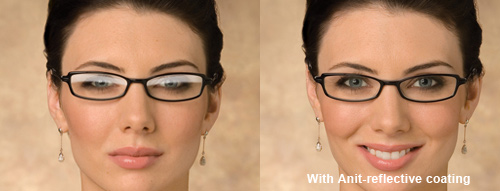
 |
Back to top |
Transition Lenses
Photochromatic lenses are ideal for people who regularly find themselves switching between indoor and outdoor environments. The convenience of not having to switch between spectacles and prescription sunglasses is a huge advantage.
Technology is improving all the time with photochromatic lenses. Photochromic lenses darken automatically when exposed to sunlight, then fade back when you return indoors. In most cases, photochromic lenses are clear (or nearly clear) indoors and darken to a medium sun tint outdoors blocking 100% of harmful UVA and UVB rays. The UV light triggers the photochromic molecules in the lens and begin to change it's structure.
Car windscreens have a UV coating which blocks 99% of the UV light so the lenses do not darken noticably when driving.
Come and discuss with our optometrist about whether transition lenses are ideal for you.
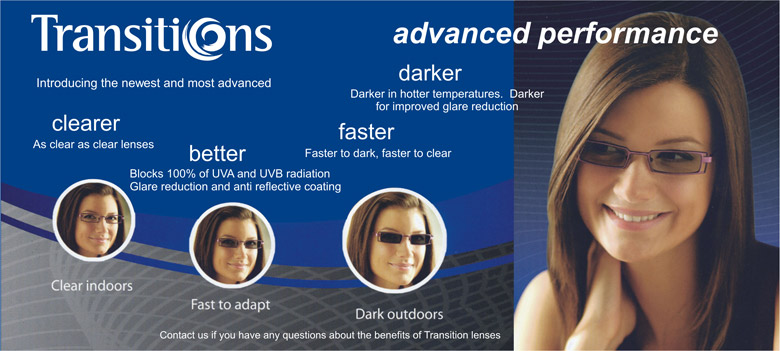
 |
Back to top |
Blue Light Lenses and Filters
Blue light lenses filter the blue light produced from electronic screens such as computer, tablets, phones and other digital devices. There is much debate as to whether they are necessary, as exposure to natural sunlight produces far more blue light than a small screen. Experts agree that exposure to blue light can disrupt your sleep and wake cycle patterns. Daylight, which contains blue light, helps to tell your internal clock when it’s time to start the day or to go to sleep. If you stare at a device that emits blue light (like your phone or computer) for too long at night, your body might think it’s still daytime and suppress melatonin production, keeping you alert for longer. So, if you find yourself working in front of screens or watching screens at night, then blue light lenses might be for you.
The blue light lenses or filters won't reduce headaches or eye strain from excessive screen time. These maybe symptoms caused by another eye condition.
Come and discuss with us whether blue light lenses are for you.

 |
Back to top |
How To Clean Your Glasses
Looking After Your Glasses
Your glasses will last longer and feel more comfortable with proper care. Avoid taking the glasses off with one hand as this can cause them to twist and place stress on the frame. Protect your glasses by returning them to their case when not in use and never lay the frames down on their lenses. We also recommend keeping an old pair of glasses as a spare pair in case of an emergency. Most importantly don't give them to young children to play with, they are not a toy.
|
Looking After Your Lenses Dirt, dust and tiny scratches can reduce the clarity of your lenses. We recommend cleaning your lenses regularly. Never rub your lenses when they are dry. The dust and dirt becomes an abrasive compound that can damage your lenses even more. Use warm soapy water to wash the dust and dirt off and then dry with a recommended cleaning cloth. An alcohol based cleaning solution is best for cleaning lenses with an anti-reflective coating. The alcohol content helps the solution evaporate from the lenses leaving no smudges or marks. At Focal Point we stock all the recommended cleaning products. |
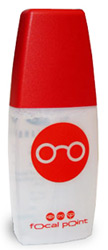 |
Repairs
Don't panic! If you are wise you will always have an emergency pair of glasses. At Focal Point we offer a comprehensive repair service. If your frame breaks or a screw comes loose, we will do our best to fix it. Unfortunately not all breakages are repairable.
All frames purchased at Focal Point have an exclusive 2 year warranty. Should your frame break under normal wearing conditions we will repair it of replace it for free. This warranty does not cover loss or theft. Included with your purchase are free adjustments and ultrasonic cleaning for the life of your frame.REPAIRS
 |
Back to top |




 Progressive Lenses
Progressive Lenses